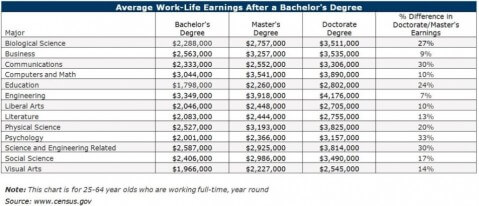Pros and Cons of Getting a Master’s before a Doctorate, Part 2: The Pros and Cons of a Master’s Degree
Is the time and money of a master’s worth it? If you are considering going to graduate school, you are most likely pondering which degree to get. There are pros and cons to earning a master’s degree before pursuing a doctorate. Master’s degrees are more career-oriented and doctoral degrees focus more on research. If all you want is a raise, pursuing a doctorate is probably not the route to choose. If you love learning and you want to pursue a career in education or research, then the work required for a doctorate may be worthwhile.
When considering the advantages of each program, remember that masters and doctoral programs will give you in-depth training in a specialized field and the usefulness of each degree depends on your academic and career interests/goals. When carefully considered, graduate school earns you more than just another fancy paper to go on your wall.
Pros
There are numerous benefits of a master’s degree. There is a reason so many people return to school after working for a few years. A master’s program narrows your field of study and delves you deeper in to the field, forcing you to master the subject. While it may be difficult to consider more schooling, consider making graduate school your next step, especially if you want a job that requires more training or a higher starting salary. Unlike your undergrad degree, there are no general studies requirements in graduate school, which is ideal for those with a thirst for knowledge.
A Master’s Degree will introduce the Process of Graduate Study
Graduate work is on a different level than the work you did as an undergraduate. A master’s program will introduce to you the process of graduate study. Students coming straight from an undergraduate program will probably be surprised at how theoretical the material in a doctoral program is. People coming in with a master’s degree will have already learned some of this, and are less surprised at the content of doctoral courses. Typical college courses present a broad overview of a subject. Graduate school can be very competitive and is a lot of work. Many students who floated through undergrad are surprised to find that graduate programs require a much greater commitment, and it is not until students immerse in a field that they truly come to know the depth of their interest.
Although most undergraduate degrees allow students the opportunity to choose subjects of interest, a Master’s degree does this to a greater extent, where you will conduct independent research in order to develop your thoughts and ideas. For many students with passionate academic interests, there’s little need to question the value of a Master’s degree; the experience itself provides plenty of satisfaction by attending extracurricular activities and meetings, hearing from guest speakers and lecturers, and one-on-one supervision.
A Masters May Help Admission into A Doctoral Program
Become an expert in your area of interest. If you’re intent on contributing to the world, professionally or academically, you will need to know your field inside and out—starting with a master’s degree.
Not all college graduates are competitive doctoral program applicants right out of undergraduate school. A master’s program can help you improve your academic record and show that you are committed, interested, and qualified in your field of concentration. As a master’s student, you will have contact with graduate faculty who teach in the doctoral program, as well as doctoral students (who often take many of the same classes as master’s students), which will give you a chance to get some insight from current graduate students on what life is like in a doctoral program. However, admission to a doctoral program is not guaranteed.**
**Before you choose this option,
be sure that you can live with yourself if you don’t get accepted.**
Cons
Being a scholar has changed many lives in terms of job, personal success, and social status. Therefore, there are obviously many benefits of earning a doctorate. However, the way to the doctorate is very long and tiring. Here are some reasons many opt not to get a higher education.
A Master’s is Time Consuming
If you’re getting a doctorate, you’re going to be in school for many years. A doctoral degree can take over five years to complete. By that time, many college graduates with bachelor’s degree are well into their professional career. Getting a master’s on top of that adds 1–3 more years to your time in a graduate program. Is that something you really want?
As mentioned, typically, a full-time master’s program will require at least two years of studying; however, even though many doctoral and master’s students are in the same classes, many new doctoral students find that their master’s coursework doesn’t transfer into the doctoral program. So, if you decide to pursue a master’s degree before applying to doctorate programs, recognize that it will likely not make a dent in your required doctoral coursework. Your doctoral degree will likely take an additional 4 to 6 years after completion of your master’s program.
The prestige power of the postgraduate degree, however, is on the decline. With mass education, the number of doctorate holders is increasing, so that the elite membership and the high social status have deteriorated—especially in connection with a decrease in salary for academic professionals. This raising the question: Why choose to specialize so narrowly, work so many hours, and for so little pay when one could more lucrative employment elsewhere for less credentialing?
A Master’s is Usually Unfunded
Are you prepared to have potentially tens of thousands of dollars of debt before you begin your doctoral program? Many students find that master’s students have to pay for their program out-of-pocket, as they usually do not receive much funding for school, which is a huge con. Moreover, if you choose not to seek a doctoral degree, what employment options accompany your master’s degree? Do your homework and think carefully before enrolling in a master’s program prior to seeking a doctorate.
However, it is worth noting that you may be able to get more financial aid for pursuing a doctorate, since pursuing doctorates take longer to earn, schools recognize that those trying to get one need more financial assistance. Before choosing what kind of graduate degree to pursue, think about what you want to do after graduation. A master’s prepares students for careers that are not research focused. Therefore, if you want to work in any field of research, you need to get a doctorate.
Salary Differences
After considering the different responsibilities and commitments the two graduate programs require, look at the average salaries each program graduate. Below are the salary differences between master’s and doctoral program graduates as well as a comparison of the lifetime earnings of both degrees in respective occupations. Below is an income chart from the United States Census Bureau about employee work-life earnings of different occupations and education levels.

Overall, the average life earnings of doctorate holders are higher than other degree holders in the same industry. However, the life-earning gap between master’s and doctorates varies among different fields of study.
How Do You Decide Which Degree Is Right For You?
You may have to choose between a master’s and doctoral program depending on your educational and professional goals. Take time to determine what your career goals are and which degree would be most helpful to your success. You can find out more about the requirements in your field by doing some basic internet research, asking graduate faculty at potential programs, and speaking with professionals in your field(s) of interest. If you are unsure of your ultimate goal, consider:
· Holding off on graduate school until you better discover and define your career goals;
· Starting a master’s program and decide later whether to apply to a doctoral program.
Earning a postgraduate degree is an honor, but if you are just looking for ways to improve your career, obtaining a master’s degree may be worthwhile financially, as master’s holders receive similar work-life earning as postdocs (see above chart). As previously mentioned, in Part 1 of this blog, one way students can gauge whether they are cut out for a doctorate program is to take a few research-focused courses as an undergrad or master’s student. So, consider pursuing a doctoral degree if enjoy research and want to advance the knowledge of a field you truly love. If you are looking for a change in field, industry, or a promotion, then getting your master’s is most likely enough.
Conclusion
Knowing your professional goals will help guide your choices for graduate study. Certain career paths, such as a lawyer or surgeon, are clearly outlined with the necessary steps, including the required educational level and graduate degree. Other career paths are less restrictive and you will need to conduct more research to find out the steps. Thoroughly research your field of interest and have a strong understanding of the skills and knowledge will help inform you which degree option makes the most sense for your goals.
Ultimately, it’s up to you whether you should obtain a master’s degree before applying to doctoral programs. Also, keep in mind that some doctoral programs award master’s degrees along the way, so talk to graduate admissions advisors/faculty of programs you are considering. And, of course, if you are considering a master’s degree, discuss your educational options and career trajectory with professors or professionals in your field.
Still unsure on what program to pursue? Remember, when going to graduate school, be prepared for a different experience from your undergraduate years. When you enroll in a graduate degree program, it’s best to be and stay motivated by professional and academic goals. Read about other things PhDStudent advises to consider when deciding to go to graduate school here, here, and here.


0 comments